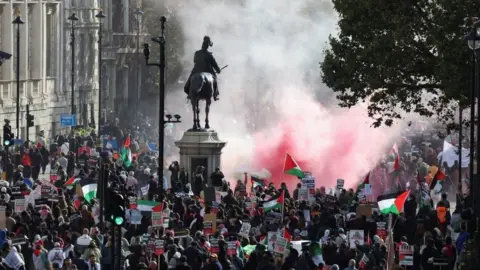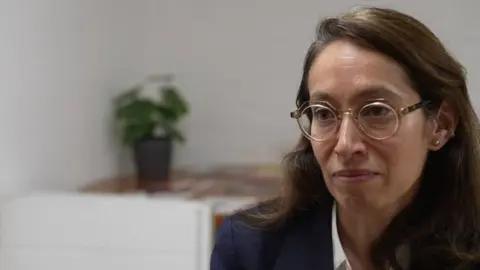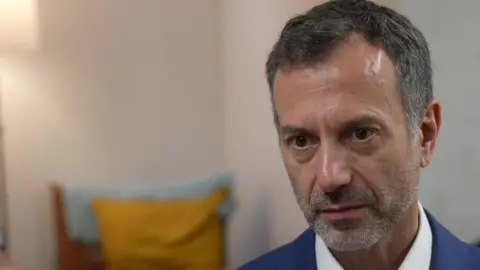London hate crime: Worry over 'significant fracture' in communities
 Reuters
ReutersIt will take London communities a long time to heal from the increase in tension over the conflict in Gaza, charities have said.
Antisemitic and Islamophobic hate crimes have increased markedly in the capital since October.
The Community Security Trust said Jewish people were feeling fearful.
Tell Mama, which supports those impacted by Islamophobia, said there was a "significant fracture" in community cohesion.
Iman Atta, from the charity, added: "It's quite deep; the bridges that we've built are shaken.
"This isn't just amongst different communities, it's within families where some support different communities, different causes, so we've seen even families aren't even talking to each other."

Figures from the Met Police show since 1 October and 13 November, there were 779 antisemitic hate crimes recorded in London, an increase of 1,200% on the same period as last year.
For Islamophobic hate crime, the same time period has seen a 236% increase to 343 reports.
The Tell MAMA project said it received reports of 69 anti-Muslim cases in London from October 7 to November 19.
Ms Atta said since 7 October, the charity has received 500 cases of anti-Muslim hate in London, while last year in the same timeframe it was dealing with 70.
These included people being "shouted at, called terrorists, murderers" and women having their headscarves pulled, she said.
Ms Atta added hate crime was heightened in London because there were larger Jewish and Muslim communities and that protests were held in the capital because it is where the main government buildings are.
"Emotions are very high, people are angry," she said.
"People are sometimes unable to express their emotions, feeling unable to speak, feeling censored, feeling grief."
She added people "were not ready" to sit with other communities and listen to what each other has to say.

Dave Rich, from the Community Security Trust (CST), said Jewish people were experiencing physical assaults, verbal abuse, antisemitic graffiti and online hate.
He said it was mainly concentrated in parts of London where the Jewish community mostly live, including Barnet, Hackney and Haringey, but that the charity was also seeing antisemitism in central London on the fringes of some of the big protests.
"Normally it's a great city to be Jewish, but right now a lot of Jewish Londoners are not feeling that way," he said.
'Heightened fear'
Mayor Sadiq Khan said hate crime was having a "chilling effect" which was "heartbreaking".
"You may not be the direct victim of antisemitic hate crime, or Islamophobic hate crime, but you feel it.
"There's this thing called heightened fear. People are now scared to leave their homes."
This week, he announced an extra £250,000 in funding to be shared by groups in the Community Alliance To Combat Hate (CATCH) partnership of which Tell Mama and CST are members of.
Mr Rich said: "We can't control what happens in a conflict thousands of miles away, but we can influence what happens here and how people in London respond to that.
"We can set an example and we can try and influence our own communities and wider society."
Ms Atta agreed, adding that although it would take a while to rebuild that "London fabric that the whole world speaks about and we're proud of", she hoped the spirit of Christmas would bring the wider London community together, "maybe in the same room, and maybe at one point they'll be able to listen to each other".
Mr Rich added: "I fear that once this conflict is over the damage on relations between communities will take a long time to heal but there's no time like the present to start working on it."

Listen to the best of BBC Radio London on Sounds and follow BBC London on Facebook, X and Instagram. Send your story ideas to [email protected]
